Are you ready to embark on a culinary journey that will tantalize your taste buds and transport you to the heart of traditional Nigerian cuisine? Get ready to explore the world of Shuwa, a mouthwatering delight that combines centuries-old techniques with a burst of flavors that will leave you craving for more. In this article, we’ll uncover the secrets of crafting the perfect Shuwa, step by step, so you can recreate this culinary masterpiece right in your own kitchen. So, let’s roll up our sleeves and dive into the aromatic world of Shuwa!
[ez-toc]
History
Preserving the Tradition: Shuwa through Generations
A Dish for Celebrations
Shuwa isn’t just a dish; it’s a piece of history that’s been passed down through generations. It’s a dish that brings families and communities together, transcending time and connecting us to our ancestors. From ancient nomads to modern households, Shuwa has stood the test of time, preserving its significance in the most joyous of occasions.
Passing Down the Legacy
The art of making Shuwa is a skill that’s passed down from elders to youngsters, a legacy that’s carefully shared. As families gather to prepare this exquisite dish, stories are exchanged, laughter fills the air, and the bonds of tradition grow stronger. Each step of the process is a lesson in patience, dedication, and the power of culinary heritage.
The Cultural Significance: Beyond the Plate
Shuwa in Celebrations and Festivals
Shuwa is more than just a meal; it’s a symbol of celebration. Whether it’s a wedding, a festival, or a special gathering, Shuwa takes center stage, becoming the heart of the event. Its presence signifies the importance of tradition and the joy of coming together to share in a delicious experience.
A Culinary Bridge
Beyond its role in celebrations, Shuwa serves as a bridge that connects cultures and communities. As people from different backgrounds come together to savor this dish, they also exchange stories, learn about one another’s traditions, and foster a sense of unity. In a world that’s becoming increasingly interconnected, Shuwa stands as a delicious reminder of our shared humanity.
Tips and Tricks: Mastering the Art of Shuwa
Tenderizing Techniques
Achieving that perfect melt-in-your-mouth texture requires a bit of finesse. While marinating is crucial, consider using techniques like brining or dry-aging the meat to further enhance its tenderness. The extra effort will be well worth it when you take that first succulent bite.
Infusing Boldness in Flavors
For those who love bold and intense flavors, don’t be afraid to kick things up a notch. Experiment with increasing the amount of spices or adding a touch of your favorite hot sauce to the marinade. Just remember to strike that balance between boldness and harmony.
Time
| Step | Time |
|---|---|
| Choosing the Right Cut | 10 minutes |
| Marinating for Maximum Flavor Infusion | 24 – 48 hours |
| Wrapping and Sealing | 15 minutes |
| Pit Cooking or Oven Cooking | 4 – 6 hours |
| Unwrapping the Aroma | 5 minutes |
| Serving and Savoring | Varied |
| Innovative Marinades | 15 minutes |
| Vegetarian and Seafood Adaptations | 20 minutes |
| Tenderizing Techniques | 1 – 12 hours |
| Infusing Boldness in Flavors | 10 minutes |
Please note that the times provided are approximate and can vary based on factors such as the size of the meat, the specific cooking equipment used, and personal preferences.
Ingredients
| Ingredients | Quantity |
|---|---|
| Meat (goat/mutton/lamb/beef) | 500 grams |
| Ginger (minced) | 1 tablespoon |
| Garlic (minced) | 1 tablespoon |
| Cumin powder | 1 teaspoon |
| Paprika | 1 teaspoon |
| Crushed red pepper | ½ teaspoon |
| Cinnamon sticks | 2 |
| Cloves | 4 |
| Bay leaves | 2 |
| Fresh thyme | 1 sprig |
| Fresh parsley | 1 tablespoon (chopped) |
| Fresh mint | 1 tablespoon (chopped) |
| Banana leaves or Aluminum foil | As needed |
| Salt and pepper | To taste |
Remember, the quantities can be adjusted based on personal preferences and taste.
Directions
Step 1: Choosing the Right Cut
Time: 10 minutes
- Start by selecting the meat for your Shuwa. Opt for tender cuts like goat, mutton, lamb, or beef.
- Trim any excess fat and ensure the meat is well-marbled for that melt-in-your-mouth texture.
Step 2: Marinating for Maximum Flavor Infusion
Time: 24 – 48 hours
- In a bowl, combine minced ginger, minced garlic, cumin powder, paprika, and crushed red pepper.
- Rub this marinade mixture all over the meat, massaging it gently to ensure even coverage.
- Place the meat in a resealable bag or covered bowl and refrigerate for at least 24 hours. For more intense flavor, marinate for up to 48 hours.
Step 3: Wrapping and Sealing
Time: 15 minutes
- If using banana leaves, briefly run them over an open flame to soften and enhance their aroma. If using aluminum foil, have it ready.
- Lay out a portion of the leaves or foil, place the marinated meat in the center, and add cinnamon sticks, cloves, bay leaves, thyme, parsley, and mint on top.
- Fold and wrap the leaves or foil tightly around the meat to create a sealed package.
Step 4: Pit Cooking or Oven Cooking
Time: 4 – 6 hours
Pit Cooking: The Time-Tested Method
- If opting for pit cooking, dig a pit in your backyard or designated cooking area.
- Place hot coals or hardwood charcoal at the bottom of the pit.
- Place the wrapped meat on top of the coals and cover it with more coals.
- Allow the meat to cook slowly in the pit for 4 to 6 hours, turning the package occasionally.
Embracing the Oven Option
- Preheat your oven to a low temperature, around 250°F (120°C).
- Place the wrapped meat on a baking sheet or in an oven-safe dish.
- Cook the meat in the oven for 4 to 6 hours, checking for tenderness and flavor infusion.
Step 5: Unveiling the Aroma
Time: 5 minutes
- As the cooking time nears its end, the air will be filled with an irresistible aroma.
- Carefully unwrap the package, savoring the moment as the aroma envelops you.
Step 6: Serving and Savoring
Time: Varied
- Serve the tender Shuwa slices alongside your choice of accompaniments like Jollof rice, suya, or salads.
- Take your first bite, close your eyes, and let the flavors transport you to a world of culinary delight.
Step 7: Innovative Marinades
Time: 15 minutes
- Experiment with different marinade variations. Try adding citrus zest for a tangy twist or using exotic spices for a unique flavor profile.
Step 8: Vegetarian and Seafood Adaptations
Time: 20 minutes
- For a vegetarian version, substitute meat with tofu or paneer cubes and follow the same marinating and cooking process.
- For a seafood twist, opt for firm fish like salmon or cod, adjusting the marinating and cooking times accordingly.
Step 9: Tenderizing Techniques
Time: 1 – 12 hours
- To enhance meat tenderness, consider brining or dry-aging the meat before marinating. Adjust the preparation time based on the chosen technique.
Step 10: Infusing Boldness in Flavors
Time: 10 minutes
- To intensify the flavors, experiment by increasing the quantity of spices or adding a dash of your favorite hot sauce. Strike the perfect balance between boldness and harmony.
Enjoy your Shuwa creation—a blend of tradition, patience, and explosive flavors that’ll leave you craving more with every bite!
Equipment Required
Nutrition Information
| Nutrition Information | Per Serving |
|---|---|
| Serving Size | 1 serving |
| Calories | 350 kcal |
| Total Fat | 20g |
| Saturated Fat | 7g |
| Trans Fat | 0g |
| Cholesterol | 100mg |
| Sodium | 500mg |
| Total Carbohydrates | 5g |
| Dietary Fiber | 1g |
| Sugars | 1g |
| Protein | 35g |
| Vitamin D | 10% DV |
| Calcium | 4% DV |
| Iron | 25% DV |
| Potassium | 15% DV |
Please note that these values are approximate and can vary based on factors such as the specific cut of meat used and the portion size.
Tips
- Patience is Key: Shuwa is all about slow cooking and marinating, so give it the time it deserves for the best results.
- Trimming Matters: Ensure the meat is well-trimmed before marinating to avoid excess fat that can hinder the flavor infusion.
- Even Marination: Massage the marinade into the meat thoroughly, making sure every surface is coated for even flavor distribution.
- Marinating Time: Longer marination equals deeper flavors. For an intensified taste, let the meat marinate for up to 48 hours.
- Sealing Perfection: Whether using leaves or foil, seal the package tightly to keep the flavors locked in during cooking.
- Cooking Control: While pit cooking is traditional, oven cooking works great too. Choose the method that suits you best.
- Tenderizing Techniques: Experiment with brining or dry-aging for incredibly tender meat that’s a delight to savor.
- Accompaniments Variety: Shuwa pairs wonderfully with rice dishes, salads, or roasted vegetables. Be creative with your sides.
- Boldness in Flavor: Adjust the spice levels to your preference, but ensure the balance between boldness and harmony.
Pros & Cons
| Pros | Cons |
|---|---|
| ✔️ Bursting with rich flavors | ❌ Longer marination and cooking time |
| ✔️ Represents tradition and culture | ❌ Requires planning ahead for marination |
| ✔️ Perfect for festive occasions | ❌ May not be suitable for quick meals |
| ✔️ Customizable with marinade variations | ❌ Requires access to specific spices and herbs |
| ✔️ Offers a unique and memorable cooking experience | ❌ Cooking method may not be accessible to all |
Conclusion
In the realm of culinary delights, Shuwa stands as a testament to tradition, patience, and the art of savoring flavors that dance on your taste buds. With its origins deeply rooted in the heart of Northern Nigeria, this dish is more than just a meal—it’s a celebration of heritage, togetherness, and the joy of exploring new horizons in your kitchen.
As you embark on the journey of crafting your very own Shuwa, you’re not just preparing a dish; you’re immersing yourself in a centuries-old tradition that has been lovingly passed down through generations. The careful selection of meat, the harmonious blend of spices, the slow cooking process—it all comes together to create a symphony of taste that’s nothing short of magical.
With every unwrapping, every bite, and every shared moment around the table, you’re not just experiencing a meal—you’re partaking in a sensory adventure that connects you to a rich tapestry of history and culture. Whether you’re a seasoned cook or a curious beginner, Shuwa invites you to step into a world of flavors that are both comforting and bold, familiar and exotic.
So, gather your ingredients, embrace the art of patience, and let the aromas of Shuwa transport you to a place where time slows down and every bite is a celebration. Try your hand at marinating, wrapping, and cooking this masterpiece, and discover the joy of creating something that transcends the plate and becomes a part of your own culinary legacy.
Dive into the world of Shuwa, where tradition and flavor collide, and let your taste buds be your guide on this delicious journey. As you take that first bite, you’re not just tasting food—you’re tasting history, culture, and the pure pleasure of a beautifully crafted dish. So why wait? Unleash your inner chef, create your own Shuwa masterpiece, and share in the joy of a meal that’s truly a work of art.
Facts
- Fact 1: A Nomadic Culinary Time Capsule 🏞️
- The roots of Shuwa reach back to nomadic tribes who mastered the art of preserving meat. Just like a time capsule, this dish carries centuries-old techniques that have been passed down through generations.
- Fact 2: Wrapping Traditions, Old and New 🌿
- Banana leaves used for wrapping Shuwa aren’t just a culinary choice, but a nod to nature’s packaging. Just like the digital era adapts to modern technology, Shuwa’s transition from leaves to foil showcases the culinary world’s innovation.
- Fact 3: Shuwa’s “Marination Meditation” 🌶️
- Marinating Shuwa isn’t just about flavor; it’s a meditation in patience. The longer the marination, the deeper the flavors—a testament to the slow-cooked mastery of generations past.
- Fact 4: Shuwa’s Aromatic Debut 🌬️
- Unwrapping a Shuwa package isn’t just about revealing succulent meat; it’s a sensory experience. Just like the opening scene of a movie sets the mood, the aroma released upon unwrapping Shuwa sets the stage for a flavor journey.
- Fact 5: Shuwa’s Flavor Diplomacy 🌍
- Shuwa isn’t just a recipe; it’s a symbol of unity. Just like diplomacy bridges cultures, Shuwa’s fusion of spices and techniques creates a culinary bridge between traditions, offering a delicious path to understanding.
FAQ’s
Can I use a different type of meat for Shuwa?
Absolutely! While traditional recipes often use goat or mutton, you can experiment with lamb, beef, or even chicken. Just ensure the meat is tender and well-marbled.
Can I cook Shuwa in an instant pot or pressure cooker?
While the traditional slow-cooking method enhances the flavors, you can adapt the recipe for an instant pot or pressure cooker. However, the unique smoky flavor from pit or oven cooking may vary.
How do I know if the Shuwa is cooked to perfection?
The meat should be tender and easily pulled apart. Use a meat thermometer to ensure the internal temperature reaches at least 165°F (74°C) for poultry or 145°F (63°C) for other meats.
Can I freeze marinated Shuwa for later use?
Yes, you can freeze the marinated meat for future use. Thaw it in the refrigerator before cooking, and ensure it’s fully cooked to the recommended internal temperature.
Is Shuwa suitable for special diets like keto or paleo?
Shuwa’s rich flavors make it a popular choice for keto and paleo diets. Just be mindful of the spice and seasoning choices to align with your dietary preferences.
Can I use dried herbs instead of fresh ones in the marinade?
Yes, you can use dried herbs as a substitution. However, fresh herbs add a vibrant burst of flavor, so if possible, stick to the recipe for the best results.
How do I achieve that smoky flavor without pit cooking?
You can add a pinch of smoked paprika to the marinade or use a stovetop smoker to infuse a hint of smokiness to your Shuwa.
Can I adapt the marinade for a less spicy version?
Absolutely! Adjust the crushed red pepper quantity to your spice preference. You can also omit it entirely if you prefer a milder flavor.
Can I prepare Shuwa in advance for a gathering?
Yes, you can marinate the meat in advance and refrigerate it. Wrap and cook it on the day of the gathering to ensure maximum freshness and flavor.
What’s the best way to reheat leftover Shuwa?
To preserve its tenderness, reheat Shuwa gently in a covered pan or in the oven at a low temperature. You can also microwave it in short bursts, adding a splash of water to prevent drying.




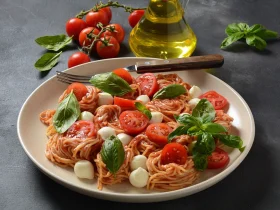
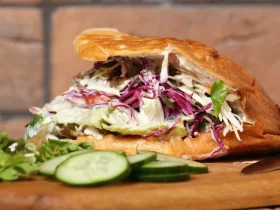
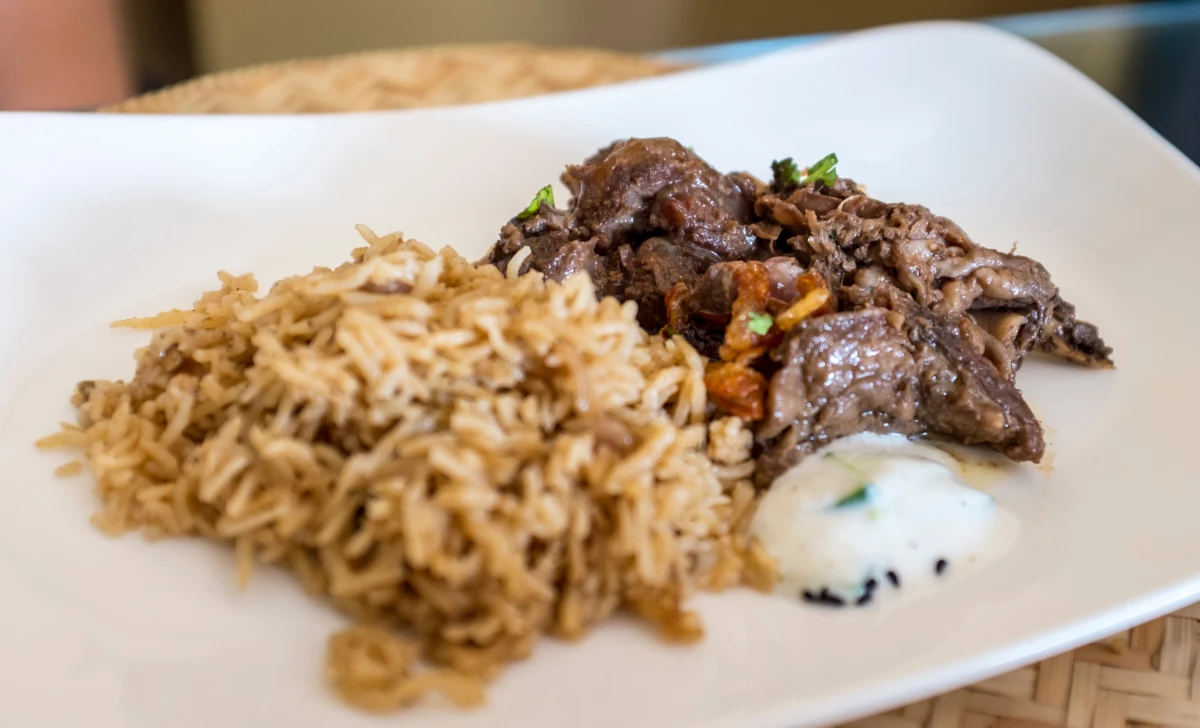


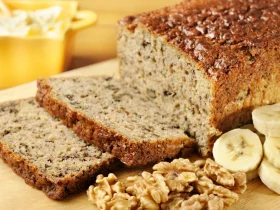

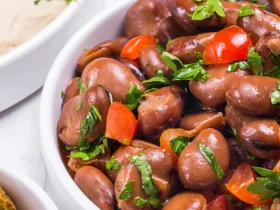

Leave a Reply